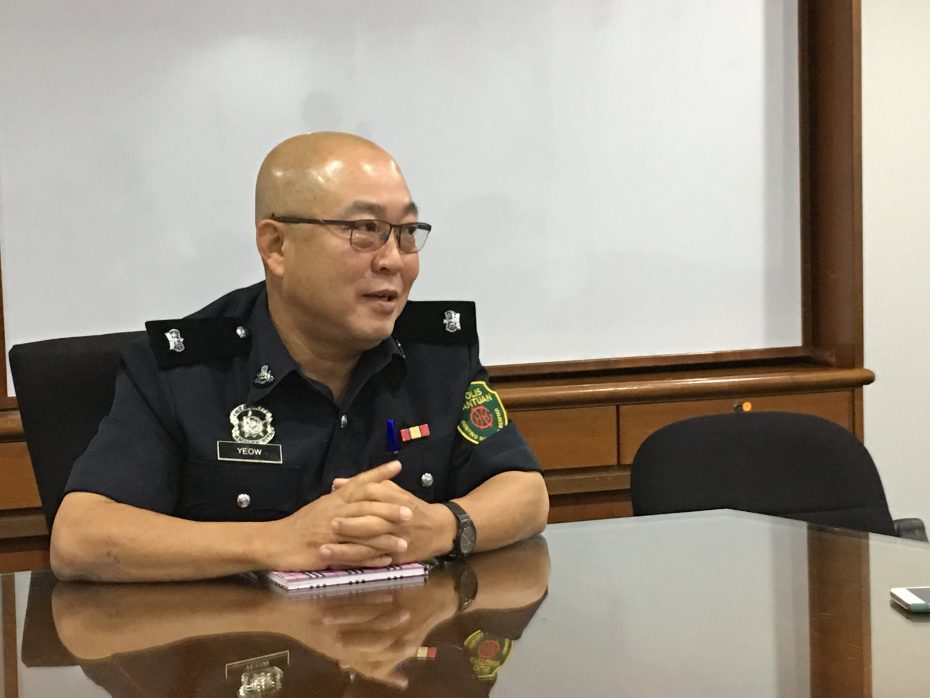by TEAM CLAIRE
BUSTING bad guys, rescuing citizens in distress, and swaggering around with firearms are all part of being a cop – according to the movies at least. To dispel some of those myths, we interviewed members of the Resort World Genting (RWG) auxiliary police about their lives and work.
RWG auxiliary police deputy superintendent Yeow Wan Long is the unit’s security manager. The 57-year-old retired police officer gave us a broad overview of the auxiliary police’s functions, trainings and departments.

DSP Yeow Wan Long, a retired police officer, has chosen to serve as security manager for the Auxiliary Police, Resorts World Genting Berhad unit.
Established 30 years ago, the RWG auxiliary police unit comprises a general division, hotel division, fire and rescue department, SWAT team and K9 unit. Today, over a thousand auxiliary police officers work at RWG.
Also known as Polis Bantuan, auxiliary police perform almost identical functions to Malaysia’s regular police force.
However, a key difference between regular and auxiliary police is that auxiliaries wield authority only in specific locales, such as First World Hotel. Regular police, on the other hand, have authority in any and every part of Malaysia.
The primary task of auxiliary police is crime prevention but they serve in places where there is shortage of manpower, or isolated areas which take time to be reached by regular police. Auxiliary police in these areas can help to immediately control the crime or solve it.
But how does one become an auxiliary police? Interested candidates or volunteers are interviewed and subsequently sent for training where they learn marksmanship and self-defence techniques, and study regulations about police and crime, including general law, the Penal Code, and criminal procedures.
Post-training, they take an examination administered by the Police Training Centre (Pulapol), including tests on foot drills, shooting, self-defence, and laws.
Auxiliary police functions at RWG are administered from a command and control centre, which Yeow called the unit’s “nerve centre”.
Nur Helmy Ibrahim, 27, a corporal at the “nerve centre”, elaborated that his team’s function is to receive and give out information regarding any incident that happens within the resort, and to be the first to respond.
As we walked through First World Hotel and RWG’s gigantic hotel-mall complexes, we noticed auxiliary police booths dotted throughout. The policemen stationed there were from the hotel division.
These smaller control centres act as information and security booths, allowing the unit to conduct surveillance of the enormous premises, as well as to assist bewildered tourists.
As Yeow and his colleague showed us around, a family approached to ask for directions. The two policemen sprang to action, offering help, knowing the mall like the back of their hands.
Yeow then led us on a tour of the fire and rescue department in First World Hotel. Members of this division undergo special training in firefighting, in addition to the standard auxiliary police training.
The division’s headquarters, separate from the fire and rescue department’s main centre of operation, is equipped with helmets, vests, and other firefighting gear for command and control officers.
The fire and rescue department also has a lot of sophisticated equipment, such as the SCBA (Safety Coating Breathing Apparatus) lab equipment, at their main centre of operations.
Mior Mohammed Azenin, 33, a corporal at the department, proudly showed off a new fire engine, and explained how the different types of firefighting equipment work.
The fire and rescue department operations are split across two shifts: morning and night shifts. Sergeants and corporals are always on standby, with the teams assisting in VIP arrivals and general operations, as well as responding to emergencies.
Being part of the police force, even as an auxiliary police officer, is no mean feat.
“Sometimes, we work for very long hours,” Yeow said. “We have to be ready for any incident. When people are sleeping, we stay awake to take care of their safety.”
It is clear that Yeow sees far more in his job than late nights and protocol. He expressed pride in his team’s work in ensuring that all RWG guests have a safe and enjoyable visit.
“This is a very good job,” he said. “To be a policeman, you must be a very kind-hearted and caring person. We work extra hours without hoping for any reward, just to make sure that people have a harmonious life.”
To his personnel, trainees, and other auxiliary police officers, he has one pertinent piece of advice: work hard and work sincerely.

